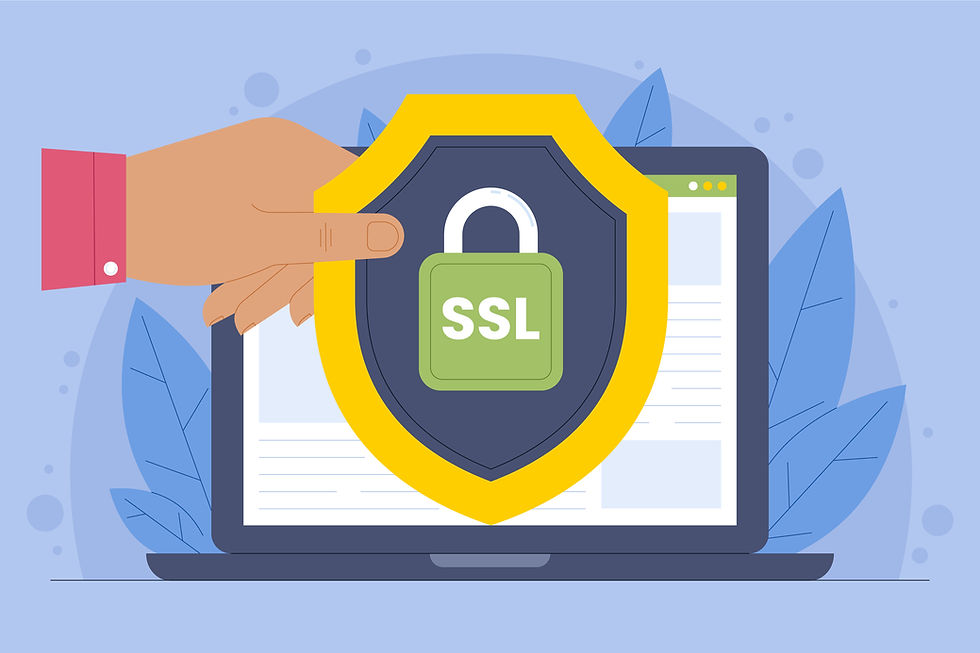Why SSL/TLS and HTTPS Matter: Certificate Expiry and Common Errors Explained
- Digital Freelancer
- May 28, 2024
- 3 min read
Updated: May 29, 2024

Among the critical components ensuring web security are SSL (Secure Sockets Layer), TLS (Transport Layer Security), and HTTPS (Hypertext Transfer Protocol Secure). These technologies protect data, maintain privacy, and ensure the integrity of information exchanged over the internet. However, understanding their necessity, the reasons behind SSL certificate expiry, and common errors like those encountered with Apple Music can sometimes be complex. This blog will dive into these aspects, providing clarity and insights.
Why Are SSL/TLS and HTTPS Necessary?
Protection in Transit: SSL and TLS encrypt the data transmitted between a user's browser and a web server. This encryption ensures that even if data is intercepted, unauthorized parties cannot read or use it.
Preventing Data Theft: Encryption protects sensitive information such as credit card numbers, personal details, and login credentials from being stolen during transmission.
Verifying Identity: SSL certificates authenticate the identity of a website, ensuring that users communicate with a legitimate site and not an imposter. That prevents man-in-the-middle attacks where a hacker could intercept and alter communication between the user and the website.
Building Trust: When users see the padlock icon and "https://" in the URL, they are assured that the site is secure and trustworthy, essential for e-commerce sites, online banking, and any platform requiring personal information.
Ensuring Data Consistency: SSL/TLS ensures that data sent and received is not tampered with. Any modification of the data during transmission will be detected, thus maintaining the integrity and accuracy of the information.
Why Do SSL Certificates Expire?
Regular Validation: SSL certificates are issued for a limited period (usually one to two years). Regular renewal and validation processes ensure the certificate holder’s identity is verified periodically, reducing the risk of long-term misuse.
Updating Encryption Standards: The technology and encryption methods used in SSL/TLS certificates continuously evolve. By renewing certificates, organizations ensure they use the latest security standards, protecting against newly discovered vulnerabilities.
Periodic Review: Expiry forces organizations to regularly review and update their security practices, ensuring they do not become complacent about security.
Compliance Requirements: Regular renewal of SSL certificates helps organizations comply with industry standards and regulations, such as the Payment Card Industry Data Security Standard (PCI DSS).
Common SSL/TLS Errors and Solutions
Issue Description: Users of Apple Music sometimes encounter SSL errors, typically due to issues with the SSL certificate validation process. That can happen due to expired certificates, misconfigured certificates, or network-related issues.
Solution: Ensure that the SSL certificate for Apple Music is valid and properly configured. Users can try updating their software, clearing cache, or resetting network settings to resolve the issue.
Issue Description: When an SSL certificate expires, users will encounter security warnings when trying to access the site, indicating that the site is not secure.
Solution: Regularly monitor the expiry dates of your SSL certificates and renew them before they expire. Many certificate authorities (CAs) offer automated renewal services to prevent downtime.
Issue Description: A standard error occurs when the domain name on the SSL certificate does not match the domain name in the URL.
Solution: Ensure the SSL certificate is issued for the correct domain name. Use wildcard certificates or multi-domain certificates if necessary.
Issue Description: This error occurs when the SSL certificate is issued by a CA that is not trusted by the browser.
Solution: Obtain SSL certificates from reputable and well-known CAs. Ensure that intermediate certificates are correctly installed on the server.
Issue Description: These warnings occur when a secure HTTPS page includes resources (images, scripts, or stylesheets) loaded over an insecure HTTP connection.
Solution: Ensure that all resources on the page are loaded over HTTPS. Update URLs in the website’s code to use HTTPS.
Conclusion
SSL, TLS, and HTTPS are vital components of modern web security, ensuring data encryption, authentication, and integrity. They protect sensitive information and build trust between users and websites. Regular renewal of SSL certificates is crucial for maintaining security standards and protecting against vulnerabilities. Understanding and addressing common SSL/TLS errors can help maintain a secure and trustworthy online presence.
By staying informed and proactive about SSL/TLS and HTTPS, businesses can protect their digital assets, safeguard customer data, and maintain the trust of their users. Whether dealing with SSL certificate expiry or common errors, proper steps can make all the difference in maintaining a secure and reliable online environment.


Comments